
Zutot
Scope & Guideline
Connecting Ideas in Arts, Humanities, and Beyond
Introduction
Aims and Scopes
- Jewish Historical Studies:
The journal publishes papers that delve into various aspects of Jewish history, including biographies of prominent figures, historical events, and the evolution of Jewish communities worldwide. - Textual Analysis and Commentary:
There is a strong emphasis on the analysis of Jewish texts, including commentaries, liturgical works, and philosophical writings, which seeks to uncover their historical and theological significance. - Cultural and Social Dynamics:
Research on the cultural practices, social interactions, and community structures of Jewish groups throughout history is a key focus, highlighting how these elements shape and reflect Jewish identity. - Interdisciplinary Approaches:
Utilizing methodologies from fields such as sociology, anthropology, and linguistics, the journal encourages interdisciplinary research that provides new insights into Jewish studies. - Rabbinic Literature and Theology:
The exploration of rabbinic texts and theological discussions is central to the journal's aims, often examining how these texts influence contemporary Jewish thought and practice.
Trending and Emerging
- Community and Identity in Modernity:
There is an increasing emphasis on how Jewish communities navigate their identities in modern contexts, reflecting broader societal changes and challenges. - Historical Narratives and Personal Accounts:
A trend towards personal narratives, such as autobiographies and letters, is emerging, providing unique insights into the lived experiences of individuals within the Jewish community. - Cultural Interactions and Exchanges:
Research exploring the interactions between Jewish culture and other cultural contexts is becoming more prominent, highlighting the complexities of cultural exchange throughout history. - Digital Humanities in Jewish Studies:
The integration of digital tools and methodologies in Jewish studies is on the rise, allowing for innovative research approaches and broader accessibility to Jewish texts and historical data. - Re-evaluating Historical Figures and Events:
There is a growing trend to critically reassess well-known historical figures and events within Jewish history, providing new perspectives and interpretations that challenge traditional narratives.
Declining or Waning
- Jewish Military History:
There has been a noticeable decline in publications specifically addressing the military experiences of Jewish individuals, such as the memoirs of Jewish soldiers, which were previously more common. - Sephardic Cultural Studies:
Research specifically centered on Sephardic traditions and history appears to be waning, with fewer papers focusing on these topics compared to the growing interest in Ashkenazic studies. - Theoretical Discussions in Jewish Philosophy:
The journal seems to be moving away from heavy theoretical discussions regarding Jewish philosophy and theology, favoring more historical and empirical studies. - 19th Century Jewish Reform Movements:
There is a reduced focus on the analysis of Jewish reform movements from the 19th century, which were previously a significant area of exploration, indicating a shift towards contemporary issues.
Similar Journals
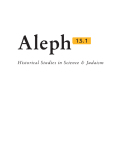
Aleph-Historical Studies in Science & Judaism
Unraveling the Tapestry of Science and ReligionAleph-Historical Studies in Science & Judaism, published by Indiana University Press, is a pivotal journal at the intersection of history, religious studies, and the philosophy of science. With an ISSN of 1565-1525 and an E-ISSN of 1565-5423, this journal has gained recognition for its insightful exploration of the complex relationships between scientific practice and Jewish thought from 2009 to 2023. Operating from the heart of the United States, Aleph currently holds a Q4 category ranking in History, History and Philosophy of Science, and Religious Studies, reflecting a growing interest in its unique contributions to these fields. Notably, it ranks within the 79th percentile in Arts and Humanities History and Religious Studies, underscoring its significance in advancing scholarly dialogue. Although currently not an Open Access journal, it remains an essential resource for researchers, professionals, and students dedicated to uncovering the narratives that shape our understanding of science and religion.
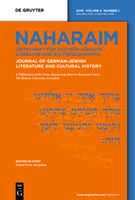
Naharaim
Illuminating the Rich Tapestry of the Near EastNaharaim is a distinguished academic journal dedicated to fostering interdisciplinary scholarship in the field of Near Eastern studies. Published by Walter de Gruyter GmbH, this journal aims to provide a platform for innovative research that explores the rich historical, cultural, and social dynamics of the region. With an ISSN of 1862-9148 and an E-ISSN of 1862-9156, Naharaim adheres to high academic standards, although it does not currently offer open access options. The journal aspires to engage a global audience of researchers, professionals, and students eager to contribute to and gain insights from the evolving discourse surrounding Near Eastern cultures and histories. Through rigorous peer-reviewed articles, Naharaim plays a vital role in advancing knowledge and understanding in a field of study that is increasingly relevant in today’s interconnected world.

Kwartalnik Historii Zydow-Jewish History Quarterly
Fostering Understanding of Jewish Cultural LegaciesKwartalnik Historii Żydów - Jewish History Quarterly is a dedicated academic journal published by the esteemed Jewish Historical Institute in Warsaw, Poland. With an ISSN of 1899-3044, this quarterly publication serves as a vital platform for scholarly discourse on Jewish history, culture, and heritage. The journal aims to reflect the diversity and complexity of Jewish experiences across historical contexts, making it an essential resource for researchers, professionals, and students in the fields of History, Religious Studies, and Cultural Studies. Despite its recent coverage discontinuation in Scopus from 2012 to 2015, the journal's rankings within its respective categories indicate a modestly engaged readership and potential for contribution, particularly seen in its ranks of 339/388 in Religious Studies and 859/975 in History. Although the journal operates on a non-open access basis, its curated articles enrich the understanding of Jewish narratives and interactions within broader socio-cultural frameworks, underlining its importance in promoting historical knowledge and cultural appreciation.

Journal for the Study of Judaism
Elevating Discourse in History and Religious StudiesJournal for the Study of Judaism, published by BRILL, serves as a vital platform for scholarly discourse in the fields of History, Literature and Literary Theory, and Religious Studies. With a commendable impact factor and ranking in the Q2 and Q3 quartiles across its respective categories, this journal facilitates high-quality research that explores the multi-faceted dimensions of Jewish studies from its inception in 1970 to the present day. For those who engage with the journal, the commitment to rigorous peer-review processes ensures publication of significant articles that advance knowledge and foster discussions within the academic community. As an essential resource for researchers, professionals, and students alike, the journal continues to enrich the understanding of Judaism through esteemed contributions of scholarship and critical analysis. The journal’s rich legacy and commitment to excellence make it an indispensable tool for those seeking to deepen their insight into Jewish studies and its broader implications.
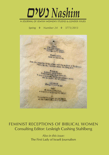
Nashim-A Journal of Jewish Womens Studies & Gender Issues
Exploring the Intersection of Gender and Jewish IdentityNashim: A Journal of Jewish Women's Studies & Gender Issues, published by Indiana University Press, stands as a pivotal platform for interdisciplinary scholarship at the intersection of Jewish studies, gender studies, and cultural discourse. With an ISSN of 0793-8934 and e-ISSN 1565-5288, this journal offers a vital repository of research and critical analysis, specifically highlighting the experiences and contributions of Jewish women across historical and contemporary contexts. Although classified in Q4 of the 2023 category quartiles for Arts and Humanities, Cultural Studies, and Gender Studies, it serves to amplify underrepresented voices and themes that are crucial for understanding societal dynamics. The journal spans from 2013 to 2024 and welcomes contributions that engage thoughtfully with gender issues in Jewish contexts, making it an essential resource for researchers, educators, and students alike, who are dedicated to exploring the rich complexities within this field of study. While Open Access is not currently supported, access to its in-depth articles can be sought through institutional databases and libraries, ensuring that its impactful research reaches those who seek it.

JOURNAL OF JEWISH THOUGHT & PHILOSOPHY
Illuminating the Intersections of Literature, Philosophy, and FaithThe JOURNAL OF JEWISH THOUGHT & PHILOSOPHY, published by BRILL, stands as a significant academic resource since its inception in 1993. With the ISSN 1053-699X, this interdisciplinary journal uniquely bridges various fields including Literature and Literary Theory, Philosophy, and Religious Studies, providing a platform for rigorous exploration of Jewish intellectual traditions and their broader cultural implications. Holding esteemed rankings across multiple categories, including Q1 in Literature and Literary Theory and Q2 in Philosophy, the journal appeals to researchers and scholars worldwide. The journal is not open access but is available through numerous academic libraries, making it accessible to those dedicated to advancing knowledge in Jewish thought. By fostering critical discourse and innovative scholarship, it remains an essential resource for understanding complex intersections of faith, ethics, and society from a Jewish perspective.
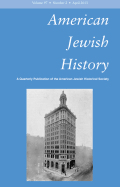
AMERICAN JEWISH HISTORY
Connecting Cultures through Historical InsightAMERICAN JEWISH HISTORY is a premier academic journal published by Johns Hopkins University Press, dedicated to the exploration and analysis of the Jewish experience in the American context. With ISSN 0164-0178 and E-ISSN 1086-3141, this journal serves as a vital resource for scholars and students in the fields of cultural studies, history, and religious studies, as evidenced by its placement in the Q3 quartile across these disciplines in 2023. Reaching a broad audience interested in the historical, social, and cultural dimensions of the American Jewish narrative, the journal has converged in various years, ensuring a robust collection of multidisciplinary research and discussions. Although it operates under a traditional subscription model, the journal remains an essential platform for critical analysis, fostering deeper understanding of Jewish identity and history. With Scopus rankings placing it at the 60th percentile in History and 62nd percentile in Religious Studies, AMERICAN JEWISH HISTORY stands as a respected publication that significantly contributes to the discourse surrounding Jewish history and culture in the United States.
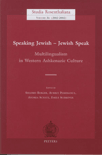
STUDIA ROSENTHALIANA
Illuminating Interdisciplinary Insights on Jewish CultureSTUDIA ROSENTHALIANA is a distinguished journal published by Amsterdam University Press, specializing in the interdisciplinary study of Jewish culture and history, particularly as it relates to the field of Rosenthaliana, encompassing literature, art, and historical scholarship. With a robust academic legacy dating back to its inception in 1970, the journal has evolved through various publication phases, maintaining a commitment to fostering scholarly discourse and disseminating significant research. Although it does not currently participate in an open access model, STUDIA ROSENTHALIANA continues to contribute invaluable insights to the fields of Jewish studies, cultural analysis, and historical research. Researchers, professionals, and students can benefit from its comprehensive essays, critical reviews, and analytical studies that enrich our understanding of Jewish heritage and modern implications. The journal's influence and relevance in its field make it an essential resource for anyone invested in contemporary debates and analyses concerning Jewish culture and identity.
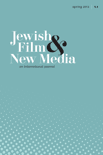
Jewish Film & New Media-An International Journal
Bridging Cultures: A Scholarly Journey Through Jewish CinemaJewish Film & New Media: An International Journal, published by Wayne State University Press, serves as a crucial platform for scholars and practitioners within the realms of Film Studies, Jewish Studies, and Media Studies. Since its inception, the journal has explored the intersection between Jewish culture and cinematic representation while also addressing contemporary media narratives. With an ISSN of 2169-0324 and E-ISSN 2169-0332, it is indexed in major databases, showcasing solid rankings in various disciplines, including a commendable Q2 rank in Visual Arts and Performing Arts. Despite its current Q4 categorizations in Anthropology and Communication, the journal is noted for its engaging contributions that sow rich discussions about Jewish identity, filmic expression, and media representation. Researchers and students alike benefit from the journal’s wealth of interdisciplinary scholarship, which spans converged years from 2013 to 2017 and 2019 to 2022, ensuring a robust timeline of critical inquiry. As an essential resource for understanding the nuances of Jewish film and new media, this journal occupies a unique niche, inviting contributions that push the boundaries of current academic dialogue.
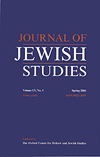
JOURNAL OF JEWISH STUDIES
Fostering Dialogue on Jewish Identity and LegacyJOURNAL OF JEWISH STUDIES, published by the Oxford Centre for Hebrew and Jewish Studies, stands as a distinguished platform for scholarly discourse in the fields of Jewish history, culture, literature, and religious studies. With its ISSN 0022-2097, this journal is recognized for its significant contributions to understanding Jewish heritage and thought, achieving commendable rankings in various categories, including Q1 in Literature and Literary Theory and Q2 in History and Cultural Studies, as of 2023. The journal fosters rigorous academic engagement and encourages researchers and scholars worldwide to explore the complexities of Jewish identity and its interconnections with broader historical narratives. Operating without an open access model, it nonetheless ensures a wide reach through its well-regarded reputation, making it an essential resource for anyone invested in Jewish studies. With a publication history spanning from 2002 to 2024, the journal continues to serve as an invaluable repository of knowledge and insight for students, researchers, and professionals alike.